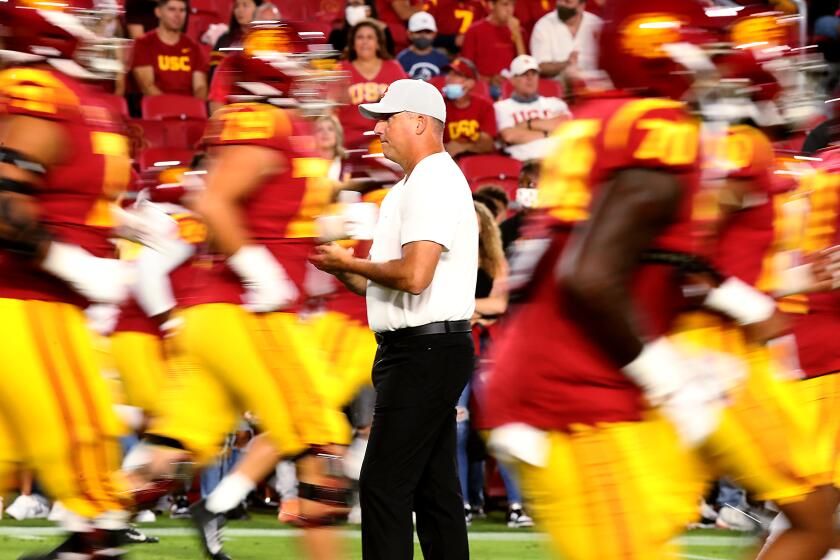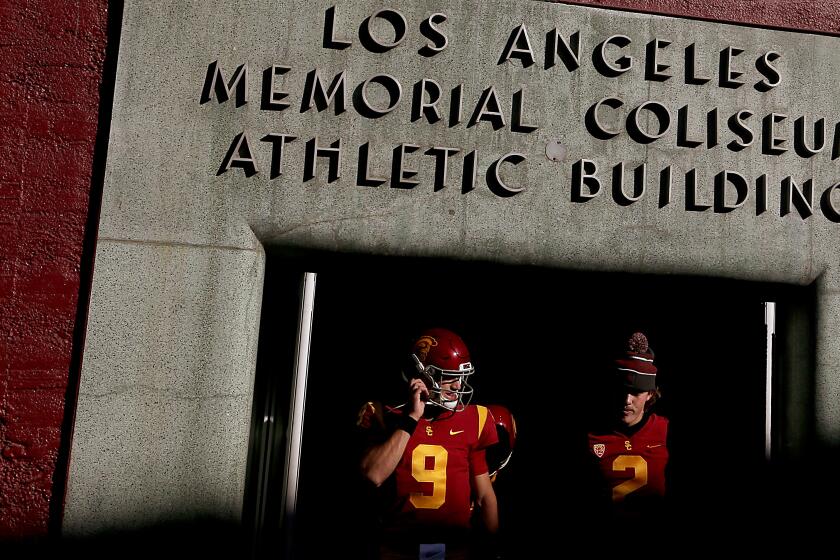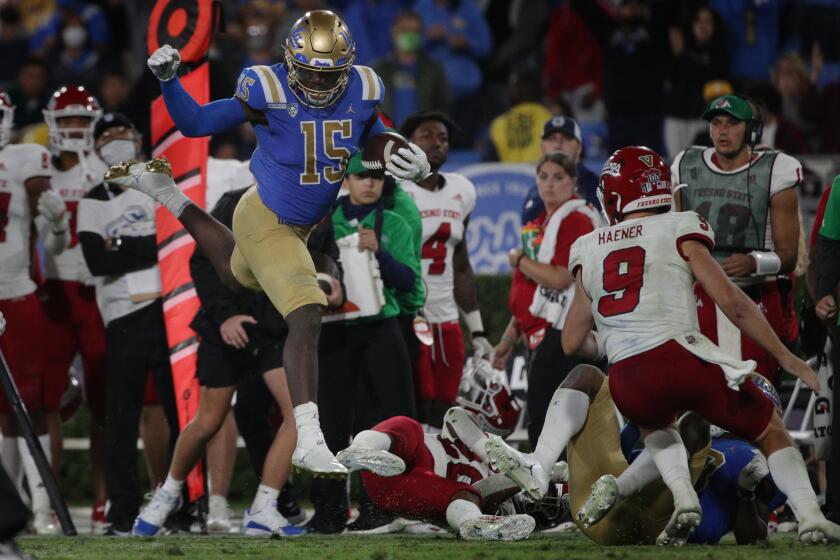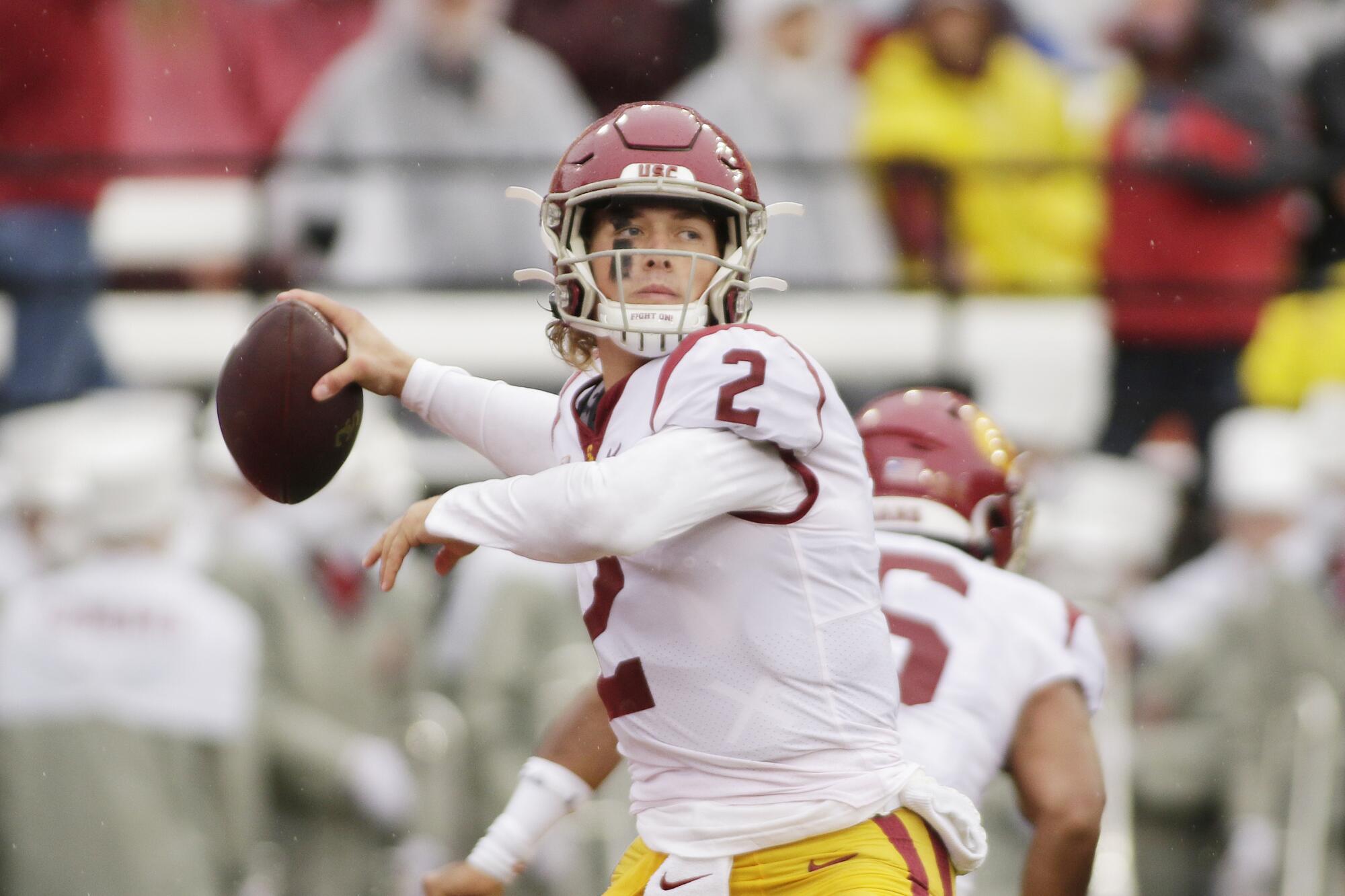
- Share via
Before his electric collegiate debut would ignite an unexpected quarterback competition, the last time Jaxson Dart forced a coach to suddenly reconsider his plans at quarterback, he was 13 years old.
It was still a few months from the start of his freshman year at Roy High School in Utah, when Dart joined his new team for the first time at a 7-on-7 tournament. He hadn’t met his teammates. He didn’t know the offense. Plus, he was already late upon arrival, having missed the first few tournaments of the summer schedule to play baseball.
The circumstances didn’t bode well for the scrawny freshman even before considering the 6-foot-3 senior transfer he was set to compete against. But as Dart laced passes around the field that first day, flashing the rocket right arm that would eventually lead him to USC, it didn’t take much convincing for Fred Fernandes. The Roy High coach could sense then, as every other coach since would learn, that competition could unlock another level in Dart — and, by extension, everyone else around him.
For a while, Fernandes still kept up the façade of a quarterback battle. But before the first tournament was over, he approached Dart’s father, Brandon. “I can already tell he’s going to be our guy,” he told him.
Beyond USC’s high-profile coaching change, take a closer look at what has gone right and wrong for the Trojans through six games this season.
“It really wasn’t close in anyone’s eyes,” Fernandes recalls now. “Except maybe the other quarterback.”
Four years later, during a dynamic, rain-soaked afternoon in Pullman, Wash., last month, a similar sentiment would seep into the sideline at USC, where the Trojans, fresh off firing their coach, desperately needed a spark. They got more than they could’ve hoped for in Dart, who stepped in for an aching Kedon Slovis and came alive, hobbling his way to 391 passing yards and four touchdowns even after he’d injured his knee. The performance proved so extraordinary that interim coach Donte Williams would declare an open competition in its immediate aftermath.
The injury ultimately robbed Dart of another opportunity to unseat the entrenched signal-caller ahead of him, as the freshman underwent surgery on his meniscus just three days after his debut. A month later, with USC sitting at 3-3 following a bye week, Dart returned to practice, but has yet to be cleared for contact. He remains day to day as of Thursday, two days ahead of a crucial fork-in-the-road matchup with rival Notre Dame.
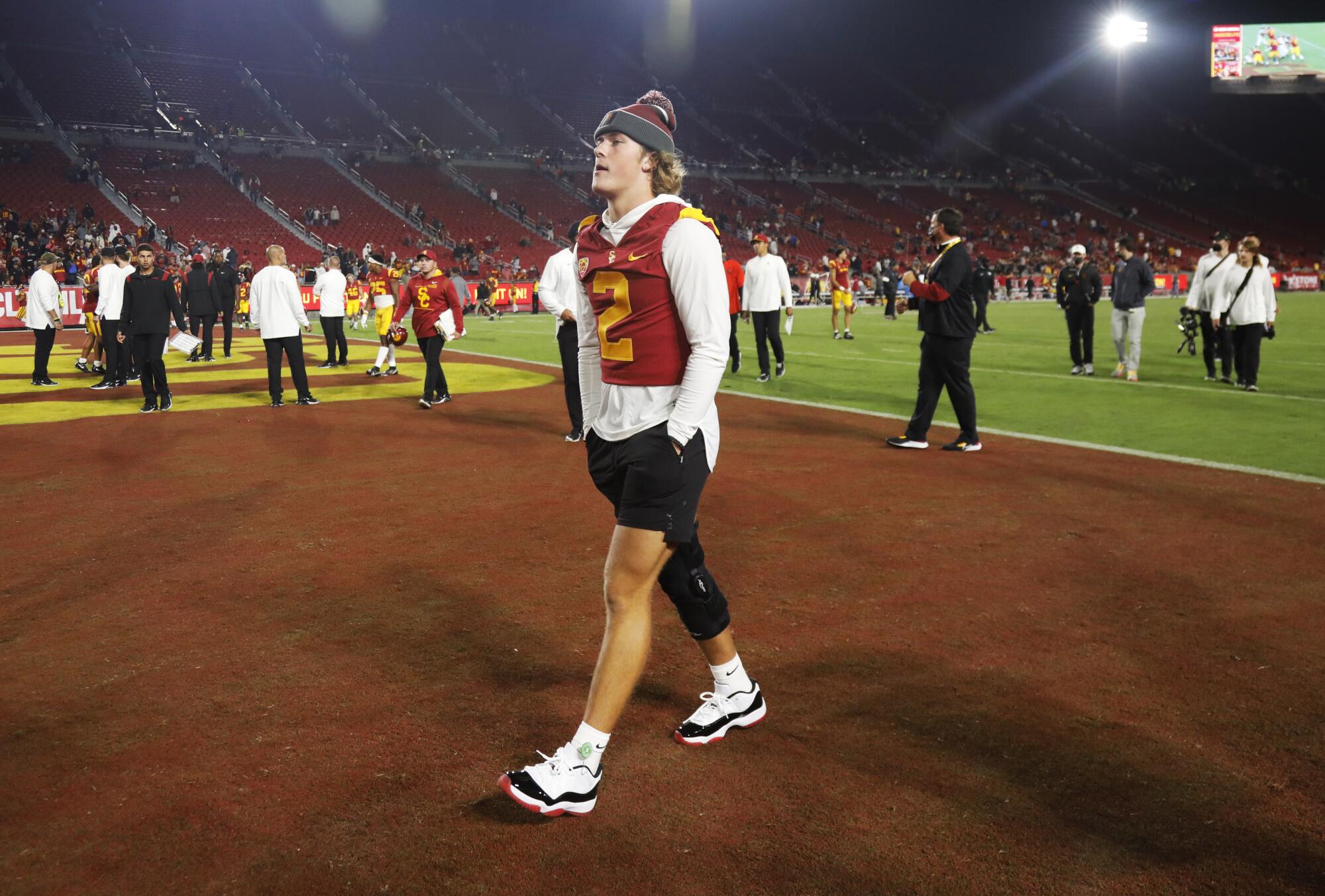
But as the freshman inches closer to a return, the same question remains: Could USC’s quarterback of the future upend its present? Better yet, should he?
At Roy, that question didn’t come without complications. The senior who transferred to be the starter didn’t take kindly to a freshman taking the job from him. Emotions ran high. Feelings were hurt.
“They tried to get the district involved,” Brandon Dart recalls. “It wasn’t just an easy thing.”
As Dart weathered a contentious competition, Brandon chose not to step in. He was resolute in his belief that his son should learn to navigate on his own. From an early age, the Darts had thrust their son into challenging, high-pressure situations and forced him to figure them out for himself. They’d kept him in multiple sports in order to add as many pressure-packed situations as possible, and they’d chosen Roy High, in part, because they knew he would have to earn his keep in an environment where he wasn’t comfortable. They wanted him to be humbled.
It was a major test for a teen quarterback. But Dart handled it quietly, never mentioning the tension between the two quarterbacks to his parents. Instead, he kept his head down and tried to avoid distractions, quickly earning his teammates’ trust.
For Dart, that part had always come naturally. His energy was contagious. Coaches observed that other players seemed to orbit around him. “He just had this innate ability,” Fernandes said. “I don’t even know how to describe it, but guys just rallied behind him.”
Rick Neuheisel, Jim Mora, Dave Wannstedt and Mike Stoops discuss questions facing USC leaders as the Trojans compete with LSU for a new coach.
Before long, the other quarterback left the team.
“I felt like I had to mature really fast through that,” Dart said of his first quarterback competition. “I always treated the other guys the same no matter what. But like, obviously, I’m super competitive. I had my eyes set on something. Sometimes, that happens when you have the same goals and same aspirations as someone else.”
By his junior season at Roy, Dart had even higher aspirations. After suffering an elbow injury as a sophomore, he worked hard to come back even better. But by that point, it was clear Roy, with an offense based in the old-fashioned single wing, couldn’t offer the high-flying fireworks necessary to lure Power Five recruiters to Utah, a state that had produced just two top passer prospects in the previous 10 years.
It wasn’t an easy decision to leave Roy, where he’d grown close to Fernandes. But in three seasons, Dart had barely gotten any Power Five phone calls, let alone offers. Fernandes understood that he needed to leave to live up to his soaring potential.
The conversations began that December, soon after his junior season ended. Still, Dart agonized over the move.
“The kid balled for an hour trying to tell me he was transferring,” Fernandes said. “But it was the best thing for him.”
Dart believed he was capable of more. He wanted something bigger, a wide-open offense that would allow him to flourish, and he found that in Corner Canyon, the two-time defending state champion an hour up the road. To leave the comforts of Roy, though, meant moving in with his aunt and being thrust into a new situation, with new teammates and a new offense.
“He wasn’t resigned to just going for the backup job. He wanted to go for No. 1.”
— Fred Fernandes, former high school coach of USC quarterback Jaxson Dart
It would be up to him then to prove he was the quarterback he believed himself to be.
“Jaxson bet on himself,” Brandon Dart said. “There were no guarantees. He had to perform.”
It didn’t hurt that Corner Canyon, where New York Jets rookie passer Zach Wilson once starred, was without a clear starting quarterback. When Dart arrived, coach Eric Kjar said, the transition was seamless. He took 90% of the reps almost immediately.
“Just seeing his ability, that was the biggest thing,” Kjar said. “His teammates were just like, ‘Oh yeah, this’ll work.’”
Everything seemed to be falling into place. Then, the pandemic hit. All of a sudden, it was unclear if Dart would even get the chance to step into the spotlight he so desired. The family questioned if they’d made the right decision.
But Dart was determined. With the world in quarantine and the season in jeopardy, he trained as much as he could on his own. Every few weeks, he and his father flew to Southern California to work with Taylor Kelly, John Beck and Adam Dedeaux at 3DQB, a renowned quarterback training facility in Huntington Beach where the likes of Tom Brady and Drew Brees had trained. Working alongside Wilson and other top-notch quarterbacks, it was clear to the trainers working with him that he just needed a season to happen for offers to roll in.
“You would watch him throw versus some of these kids with big-time offers, and you wonder, how in the hell did he not get picked up early?” Kjar said. “Even though he’s from Utah, I just didn’t get it.”
As USC and LSU leaders search for a new football coach, we evaluate which job is better.
By the fall, the only big-time football program that had shown interest was Brigham Young, just down the road in Provo. But once Utah greenlighted its high school season, Dart didn’t last long under the radar. He accounted for five touchdowns in his debut, while throwing one incomplete pass. The next week, he had over 500 yards of offense and six touchdowns. The secret was out.
Everything changed the next week in a nationally televised game against Bingham. Ahead of the game, something like 17 Power Five staffs told Dart that they’d be watching him closely.
“You came here for a reason,” Brandon told his son before the game. The pressure only seemed to fuel him. He passed for six touchdowns again while adding 132 yards on the ground.
After the game, Brandon pulled his son aside on the field and hugged him.
“Your life is going to change,” he told Dart. They’d spend the entire next day sifting through texts and direct messages from college coaches.
It all felt surreal, even as Dart arrived at USC the next spring with the expectation that he’d be competing for the backup job. Immediately, the freshman turned heads on the field. Off of it, teammates raved about his work ethic.
“I want to be out there as much as I can. I just love being on the field and especially just getting a taste of it in that Wazzu game, the vibe, everything, it’s super addicting.”
— Injured USC quarterback Jaxson Dart
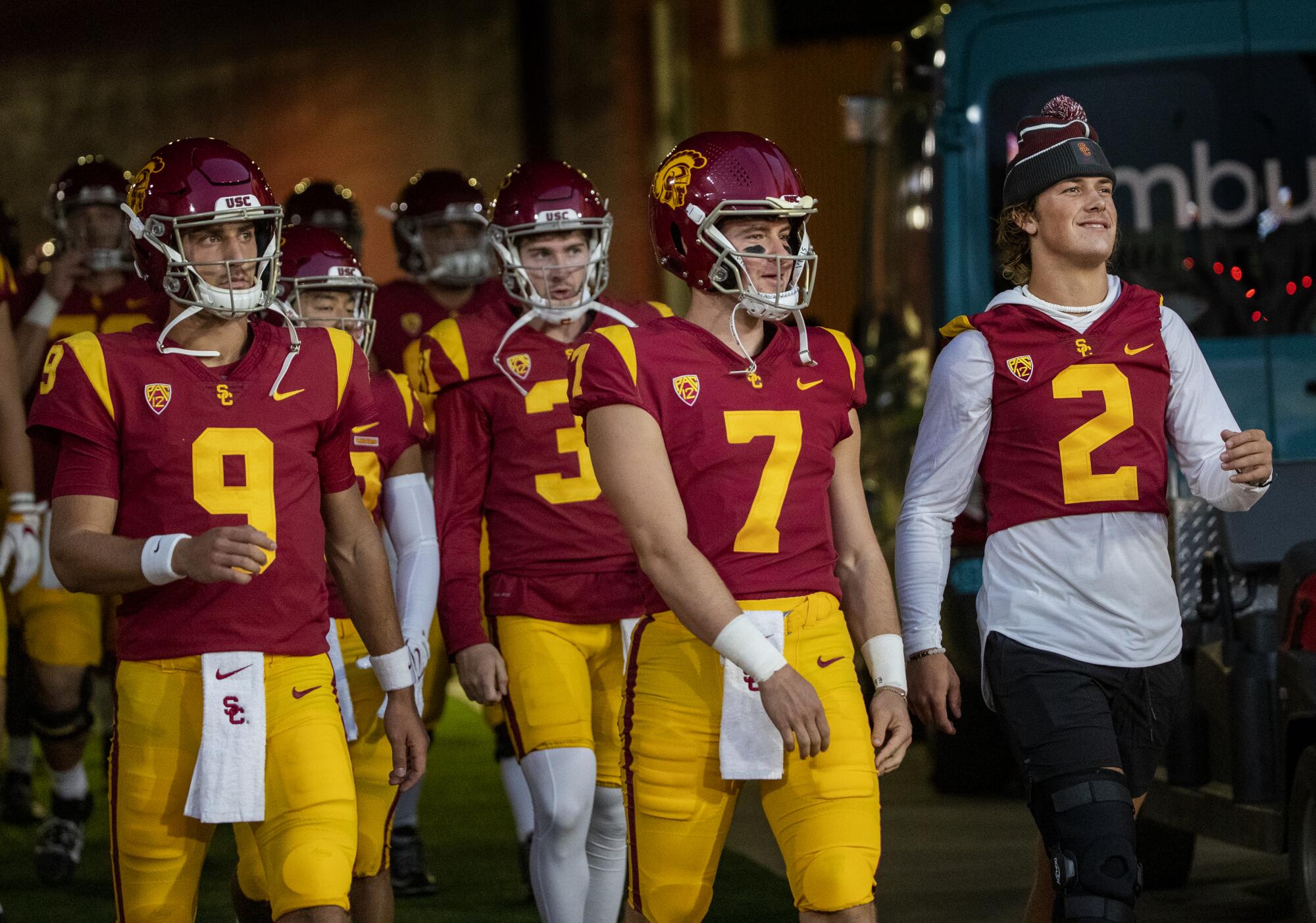
By the end of spring, he told Fernandes he had a new aspiration.
“He wasn’t resigned to just going for the backup job,” Fernandes recalled. “He wanted to go for No. 1.”
Dart may well have already reached that goal, had his knee not buckled in the midst of his breakout performance against Washington State. Even on an injured meniscus, the energy he was able to conjure from USC’s offense was unlike anything the Trojans had seen all season. After the game, center Brett Neilon raved about his “mind-boggling” performance and gleefully compared him to Sam Darnold.
But that night, as the adrenaline faded, the pain in his knee worsened. Doctors would tell him the next day they expected his recovery from meniscus surgery could last as long as two months. So Dart set out to cut that time in half — if he couldn’t compete at quarterback, he would settle for competing against the clock.
He’d spend most of the next month packing in as much rehab as possible, Zooming into his classes between hours spent in treatment.
The UCLA and USC football coaching staffs have leaned on transfers to bolster their rosters with players thrilled for a second chance at the right fit.
“It’s been really tough to say the least,” Dart said. “I want to be out there as much as I can. I just love being on the field and especially just getting a taste of it in that Wazzu game, the vibe, everything, it’s super addicting. I try to just, like, change my goals and my approach to everything, to just work really hard in rehab and try to stay on top of everything I can with football and my mental reps. I want to come back really fast.”
That work has him ahead of schedule. He’s still wearing a bulky brace on his right knee, but over the course of the last week, his practice reps have increased. While Slovis is expected to start at Notre Dame on Saturday, Dart’s return, it seems, is on the horizon.
What that means for USC’s future plans at quarterback remain to be seen. But if his past tells us anything, the prospect of competition could be all Dart needs to unlock a new level — for himself and for USC.
It wouldn’t be the first time.
More to Read
Go beyond the scoreboard
Get the latest on L.A.'s teams in the daily Sports Report newsletter.
You may occasionally receive promotional content from the Los Angeles Times.


